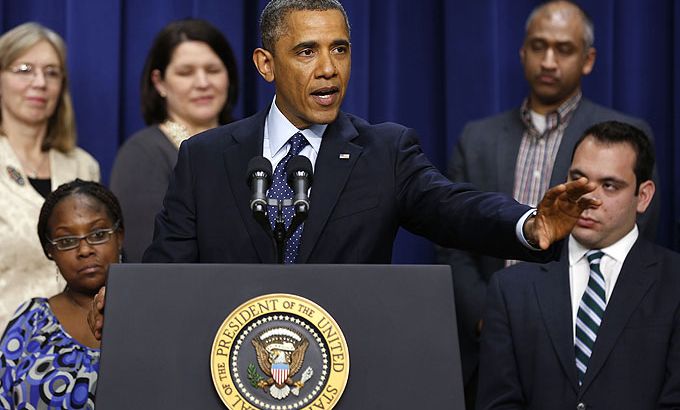US set to miss ‘fiscal cliff’ deadline
Senate reported likely to vote on 11th-hour budget deal by midnight, but House not to reconvene until later on Tuesday.

The US is on track to fall over the “fiscal cliff” at midnight on Monday, at least for a day, as some legislators remain reluctant to back last-minute efforts by Senate leaders to avert severe tax increases and spending cuts.
At the end of the work day, President Barack Obama and members of Congress acknowledged they were close, but there was still no agreement finalised between Senate Republicans and Democrats – including Vice President Joe Biden, who is now playing a key part in negotiations.
Keep reading
list of 4 itemsUS imposes new sanctions on Iran after attack on Israel
A flash flood and a quiet sale highlight India’s Sikkim’s hydro problems
Why is Germany maintaining economic ties with China?
Lawmakers worked feverishly into the night to hammer out a deal that would raise tax rates on the wealthy but preserve tax breaks for the middle class and maintain some key stimulus benefits like unemployment insurance.
“If a deal is reached, there’s little difference between a vote tonight or tomorrow to give members a chance to review,” one source told the AFP news agency.
US markets will not immediately feel the shock of the failure, as January 1 is a public holiday – giving lawmakers a short breathing space in which to hammer out a stop-gap deal and pass it through the Senate and House by Tuesday.
The Senate plan was heavy on tax increases and light on spending cuts, raising concerns that it would repel rank-and-file lawmakers in the Republican-controlled House.
As Senate Republican leader Mitch McConnell and Biden kept working on unresolved parts of the deal, there was also deep discontent among Senate Democrats.
“The caucus as a whole is not sold [on the bill],” said a Senate Democratic aide. “We just don’t have the votes for it.”
‘Deal within sight’
Earlier, the US president had said a deal on the “fiscal cliff” was within sight, but that it was not completed yet.
Speaking to an audience of middle-class taxpayers at the White House, Obama on Monday said the deal would extend unemployment benefits for Americans “who are still out there looking for a job”.
“There are still issues left to resolve, but we’re hopeful that Congress can get it done. But it’s not done,” Obama said.
He said he regreted that the work of the administration and lawmakers on Capitol Hill would not produce a “grand bargain” on tax-and-spend issues, but said that “with this Congress, it couldn’t happen at that time”.
If Congress fails to act, about $600bn in tax increases and government-wide spending cuts will begin taking effect after midnight – harsh measures that could push the US economy into recession.
|
|
| What is the “fiscal cliff”? |
But lawmakers could still vote for any deal on New Year’s Day and prevent the worst of the fiscal cliff effect.
Under the Senate plan, those with a household income above $450,000 or individual income above $400,000 would be taxed at 39.6 percent, up from 35 percent.
Republicans, who control the House of Representatives, have been against raising taxes on the rich, while the Democrat-controlled Senate and the White House have been averse to spending cuts.
Meanwhile, the country’s chronic deficit spending – about $1tn a year – continues without a deal to address it.
If there’s no deal, the effects could be harsh. The nation would lose up to 3.4 million jobs, the Congressional Budget Office has predicted. And budget cuts of up to 9 percent would hit most of the federal government.
And if the limit is not raised on how much the government can borrow, reaching the $16.4tn debt ceiling could lead to a first-ever default in February or March that would shake worldwide confidence in the United States.
On top of that, the current Congress is in session only through mid-day on January 3. After that, a freshly elected Congress with 13 new senators and 82 new House members would inherit the problem.
The uncertainty has weighed on financial markets and forced businesses to slow hiring and investment.